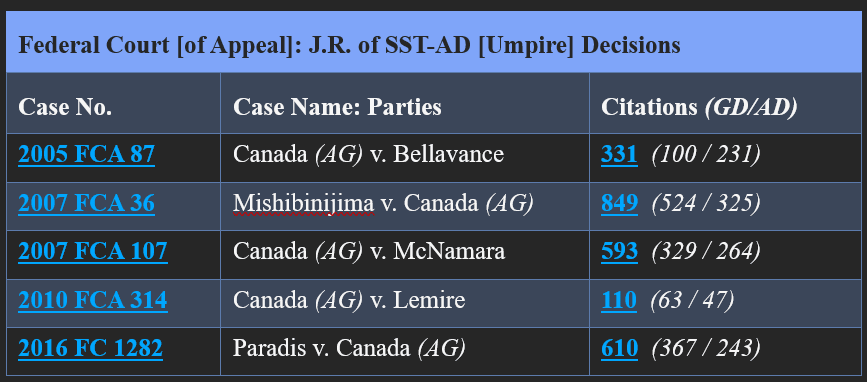(#6) Historical Cases & Abused Process :: Justice 4 EI Misconduct
(Problem #3) EI ADMs Cited Inapplicable Jurisprudence – to Abuse the Process
(#6) Inapplicable Historical Jurisprudence & Abuse of Process (Justice 4 EI Misconduct)
Disclaimer: This site contains the Personal Opinions of Canadian Citizens. All Claims are being Tested in Court. Until then, everything is for Entertainment Purposes only.
Legal Principles: Error #6 (Inapplicable Citations & Abuse of Process)
Fundamental Questions (2): #8-#9
Grounds of Review (2): FCA §18.1(4)(b-c)
Vavilov Principles (4): Decision & Outcome
(b) Other Statutory or Common Law (¶111-14)
(d) Evidence Before Decision Maker (¶125-26)
(e) Submissions of the Parties (¶127-28)
(f) Past Practices & Past Decisions (¶129-32)
Facts & Issues
Jurisprudence: Can EI ADMs reasonably apply Case Law containing substantively different (i.e. clearly distinguished) underlying Fact Patterns & Pleadings? What happens when they are shown this error, and they persist in using it anyways?
Abuse of Process: Can EI ADMs ‘Proof-Text’ Case Law to fundamentally change the established Adjudication Process? Is Procedural Fairness optional – or changeable – merely because Employers allege ‘Misconduct’?
Errors in Law: SST TMs cited Inapplicable Case Law, despite being shown how it was fundamentally different from this present Case. These Cases were also being cited ‘out-of-context’ (‘proof-texting’), ignoring the primary Reasons for their Holdings (Precedent).
Furthermore, these same irrelevant Cases are being cited in thousands of other C19-MM Cases, often using the same fallacious Reasoning processes.
Procedural Fairness: ‘Proof-Texted’ Jurisprudence is being cited to change the Adjudication Process. The statutorily-mandated fact-finding process is wilfully being avoided because ‘precedent’ ‘requires it’. (i.e. ‘Case Law supersedes Parliament’.)
Authorities
Please consider my SST-AD Written Arguments (@[P16] ‘DA-694-Args’) incorporated (by reference) into this J.R. Factum (Memorandum of Fact & Law). To save space, I won’t reprint everything it contains, but large sections are critically relevant.
This specific section incorporates the ‘Problem #2: Inapplicable Case Law’ arguments. 1
Jurisprudence
As proven above (see: Error #5: Internal Logic & Consistency), there are five primary FC[A] Cases being [mis]used to Dismiss (C19-MM) EI Appeals en masse…
They are being combined with the [fallacious] ‘4-Part Misconduct Test’ to ‘defend’ the proposition that EI ADMs cannot “consider how the Employer behaved” or “focus on the Employer’s conduct” or investigate “whether the[y] breached a term in the Contract” as that is ‘ultra vires’ – since they alleged Misconduct – which these Cases supposedly justify… 2
Historical Case Law
Since we have conclusively proven that using this Misconduct Test is unreasonable from a Logical standpoint, it’s time to address the Abusive application of these five Cases:
2005 FCA 87: Canada (AG) v. Bellavance (331 Citations: 100 + 231) | (¶3 | ¶10-11)
2007 FCA 36: Mishibinijima v. Canada (AG) (849 Citations: 524 + 325) | (¶32 | ¶2, ¶19)
2007 FCA 107: Canada (AG) v. McNamara (593 Citations: 329 + 264) | (¶9 | ¶21-23)
2010 FCA 314: Canada (AG) v. Lemire (110 Citations: 63 + 47) | (¶21 | ¶5, ¶19)
2016 FC 1282: Paradis v. Canada (AG) (610 Citations: 367 + 243) | (¶15-16 | ¶1-2, ¶34)
As proven by this table, these five Cases were cited ~2500 times. (As of: 2024-12-13) (And that’s unique Case citations: factoring multiple quotes per Case approximates 50K refs.)
While this 4-Part Test contains an Unjustified Premise (an untested, unverified assumption) that the ‘policy-violating conduct’ is inherently ‘Misconduct’, these oft-cited Cases all contain situations wherein the EI Claimant was legitimately – self-admittedly – guilty of real, proven Misconduct because they Breached their Employment Contracts.
In Paradis & McNamara, the Claimants both Failed Drug Tests, which obviously violated their Contracts – and Provincial Health & Safety Legislation. 3
[593x] 2007 FCA 107: Canada (AG) v. McNamara (¶9) | Failed Drug Test (¶21-23)
[610x] 2016 FC 1282: Paradis v. Canada (AG) (¶15-16) | Failed Drug Test (¶1-2, ¶34)
Mishibinijima had ‘persistent absenteeism’ Attendance issues (due to his alcoholism), with ‘numerous warnings’ on record, which explicitly violated his Contract. (¶19, ¶32)
[849x] 2007 FCA 36: Mishibinijima v. Canada (AG) (¶32) | Alcohol/Absence (¶2,19)
And Bellavance & Lemire both Breached their Contracts by breaking government requirements. Lemire was selling contraband cigarettes at work (which is a Criminal Offence [§121.1]) [¶21], while Bellavance was a federal government employee who repeatedly broke the HRDC ‘Code of Conduct’ (¶3,11) by “intervening personally in the processing of EI Cases” and “giving preferential treatment to some of his former employees & certain family members” – which also arguably borderlines on Criminal conduct.
[331x] 2005 FCA 87: Canada (AG) v. Bellavance (¶3) | Code/Trust/Conflict (¶10-11)
[110x] 2010 FCA 314: Canada (AG) v. Lemire (¶21) | Criminal/Contraband (¶5,19)
In all of these Cases, the Claimants Breached their Employment Contracts – and most of them also broke various government requirements. (Q: How can this finding be made if assessing CBAs is ultra vires? And why do all these Cases discuss CBA Breaches?)
Argumentation
I did not ‘Breach my Contract’ – nor was that ever Alleged. Dispositively citing Cases wherein the Claimants self-admittedly broke their Contracts – when that was never a consideration here – is clearly an Error in Law. (For me and thousands of other Cases…)
These Cases are all being cited because they provide the unfounded Justification for refusing to conduct Fact-Finding into whether the “Employer acted contrary to Law.”
It is self-evident that when Claimants admit to wilfully breaking their Contract, there is no need to look further – this amounts to a ‘joint submission’ of ‘guilt’ – any ‘reasons’ why may impact sentencing, but do not change the ultimate disposition of the Case.
It is equally self-evident that, to the contrary, when Defendants plead ‘Not Guilty’, Fact-Finding ensues to determine the Innocence or Guilt of the Accused. It would be laughable – and possibly censurable – if (after taking a ‘not guilty’ plea) the Prosecutor began citing historical Cases where other [completely unrelated] Defendants pled Guilty as ‘evidence’ to attempt to establish any Guilt in the present Case.
Why is this Injustice allowed here? This is an Abuse of Process.
Abuse of Process
Citing other Cases with different fact-patterns & pleadings – Cases where contract violations were mutually conceded – merely to ‘proof-text’ unrelated holdings where those Judges stated the obvious (that further Fact-Finding was not necessary in those Cases) is an outrageous Error in Law – and clear violation of Natural Justice (Fairness).
Given enough time, EI ADMs could find dozens (maybe hundreds?) of Cases containing any desired Judicial sentiment – and given equal time, I could likely find & cite as many ‘opposing’ holdings – and neither collection of Case Law (regardless of how many volumes we filled) would matter if the principal Facts & Pleadings were different…
Where ‘EI Guilt’ [read: Misconduct] is admitted (where EI Claimants concede that they wilfully broke their Contracts), there is clearly no legitimate reason to Fact-Find for ‘Just Cause’ – thus “considering how the Employer behaved” is obviously ultra vires.
But, where Claimants deny ‘EI Guilt’ [read: oppose Misconduct] (where Claimants clearly refute that they broke their Contract)¸ ‘thorough Fact-Finding’ is required to determine ‘Just Cause’ – it’s mandated by policy, by statute & for fundamental Justice.
It is clear error to skip this Fact-Finding exercise (deem it ‘ultra vires’) merely because the Employer alleges Misconduct – or purely because other unrelated Claimants admitted to their own Misconduct years earlier. Dispositively citing such Cases as ‘precedent’ – to justify refusal to properly investigate the 14 ‘Just Cause’ Reasons enumerated in EI Act is both Abuse of Process and Unjust.
Employers cannot unilaterally impose unlawful corporate Policies. Period. The EI Act – and the clear Legislative History & Intent of Parliament – require EI ADMs to Fact-Find for whether they “acted contrary to Law” or applied “undue pressure to [take] Leave” or made ‘significant changes’ to core Contract Terms. (per: EIA §29(c): ‘Just Cause’)
I realise that I am repeating these key facts. (Legal Truths) Yet, I have repeated them far less times than the corresponding errors were repeated in my erroneous EI Decisions.
It would be a travesty against Justice to allow this Injustice to stand Unquashed. EI ADMs are citing Jurisprudence with different Facts & Pleadings to excuse their attempts to avoid their statutorily-mandated duty to Fact-Find for ‘Just Cause’ – specifically, the [4] Reasons listed in the last paragraph. This cannot be left standing – or become precedent.
It is patently self-evident that willfully breaking a Contract is Misconduct. If full Fact-Finding is conducted – and it is legally established that the ‘violated’ Policy in question (C19-SWP) is both Lawful and Contractual – then I accept that I am Disentitled from EI.
But until this statutorily-mandated process is done, inapplicable Case Law is irrelevant. Compounding errors does not change the truth – or any legal realities…
Distinguished Cases
Another point of distinction must be made: these Cases don’t address my Argument.
When those Judges held that further Fact-Finding was unnecessary – in those Cases, under those circumstances – the objection raised was universal: those EI Claimants were alleging ‘Wrongful Dismissal’, ‘Unjustified Dismissal’ & Unnecessarily ‘Severe Penalties’. 4 I never made these arguments before either [GD] TM Usprich or [AD] TM Lafontaine (the Decision [chain] under Judicial Review).
From inception, my Argument has not changed: I want statutorily-mandated Fact-Finding for Just Cause, specifically re. ‘Contrary to Law’ & ‘Significant Changes’ to our CBA.
Citing Jurisprudence where Claimants were asking for considerations I have never sought – and using those Judges’ Denials of those requests – to deny my completely different request is disingenuous at best. And it is also another obvious Error in Law.
It is telling that both TMs refused to address my EIA §29(c) ‘Just Cause’ Arguments by citing these same five Cases ad nauseum. (43 Times!) 5
What might be worse is that [GD] TM Usprich actually mentioned ‘Just Cause’ in her Decision, but rejected it based on what section of the DBEP it appears in, while completely ignoring the text of the statute itself. (Policy over statute again‽) It was repeatedly said that I was on ‘Administrative Unpaid Leave of Absence’ 6 – which is the same wording the EI Act uses in the Interpretation section: ( in EIA §29[c] )
§29 [‘Interpretation’]: “For the purposes of §30-33, [Disqualification & Disentitlement]
§29(c): “Just Cause for […] Taking Leave from an Employment exists If the Claimant had No Reasonable Alternative to Leaving or Taking Leave, [considering when]:”
§29(c)(xi): ‘Practices of an Employer are Contrary to Law’, [or]
§29(c)(vii): ‘Significant Modification of Terms & Conditions respecting Wages or Salary’,
§29(c)(ix): ‘Significant Changes in Work Duties’,
§29(c)(xiii) ‘Undue Pressure by an Employer on the Claimant to Leave their Employment’.
(Logical Errors)
Before I leave my Arguments on Historical Jurisprudence & Abuse of Process, there is another type of unreasonableness found here: Redefinitions & Logic Errors. I continue them in a (Side-Bar), which should be incorporated by reference into Error #5.
Incorporated Into: ‘(Problem #2) Error #5: Internal Logic & [in]Consistency’
Continued Below: { ‘Problem #3 [Side-Bar]: Redefinitions & Logic Errors’ }
Sources:
Statutes
(‘CC’) Criminal Code (RSC 1985 c.46)
https://laws-lois.justice.gc.ca/eng/acts/c-46
CC §121.1: Selling [Contraband] Tobacco
(‘EIA’) Employment Insurance Act (SC 1996, c.23)
https://laws.justice.gc.ca/eng/acts/E-5.6
EIA §29(c): ‘Just Cause’ Analysis (CanLII)
Jurisprudence
2019 SCC 65: Canada (MC&I) v. Vavilov (‘Vavilov’ [¶111])
2005 FCA 87: Canada (AG) v. Bellavance (¶3 | ¶10-11)
2007 FCA 36: Mishibinijima v. Canada (AG) (¶32 | ¶2, ¶19)
2007 FCA 107: Canada (AG) v. McNamara (¶9 | ¶21-23)
2010 FCA 314: Canada (AG) v. Lemire (¶21 | ¶5, ¶19)
2016 FC 1282: Paradis v. Canada (AG) (¶15-16 | ¶1-2, ¶34)
Evidence
(‘Affidavit’) Affidavit of EI Claimant
https://Justice4EIMisconduct.com/assets/FCA-Affidavit.pdf
(‘DA-694-Args‘) SST-AD Written Arguments: ([P16]: p.244-76 [ADN6-2..34])
Error #2: Cited Inapplicable Case Law ([P16]: p.258-62 [ADN6-16..20])
In my two Cases alone (GD+AD), these 5 Cases are cumulatively cited 39 times. (15 para + 24 FNs: the actual ‘individual’ count is higher, as some citations are repeated in the same location…)
(‘DA-740’) 2023 SST 1093: DA v. CEIC (SST-GD): TM Usprich Miscited these 5x Cases 33x!
[P12]: [¶24-25] p.200 (FN:13 & 16), [¶26] p.200 (FN:18), [¶28-31] p.200f (FN:20-23), [¶32] p.201 (FN:24-25), [¶33] p.201f (FN:26-27), [¶71] p.208 (FN:48), [¶75] p.209 (FN:52), [¶79] p.209 (FN:54), [¶88] p.211 (FN:64-65), [¶92] p.212 (FN:68), [¶99] p.213 (FN:75)
(‘DA-694’) 2024 SST 26: DA v. CEIC (SST-AD): TM Lafontaine Miscited these 5x Cases 10x.
[P17]: [¶32] p.283 (FN:10), [¶40] p.284 (FN:14), [¶47] p.286 (FN:18)
The various policies, letters & documents I entered into evidence (at the CEIC alone: in 2022 only) clearly use the terms ‘leave of absence’, ‘administrative leave’ & similar sentiments 15+ different times:
(‘SRC-1’) 1x ([P01]: p.105 [GD3-24]); (‘SRC-DA’) 5x ([P01]: p.107f [GD3-26f])
(‘SRC-2’) 5x ([P01]: p.113f [GD3-32f]); (‘SRC-RR’) 3x ([P01]: p.126f [GD3-45f])
([Other]) 4x [EI App: Reason, CHRO Update, Note to File] ([P01]: p.88, 109-11 [GD3-7, 28-30])



